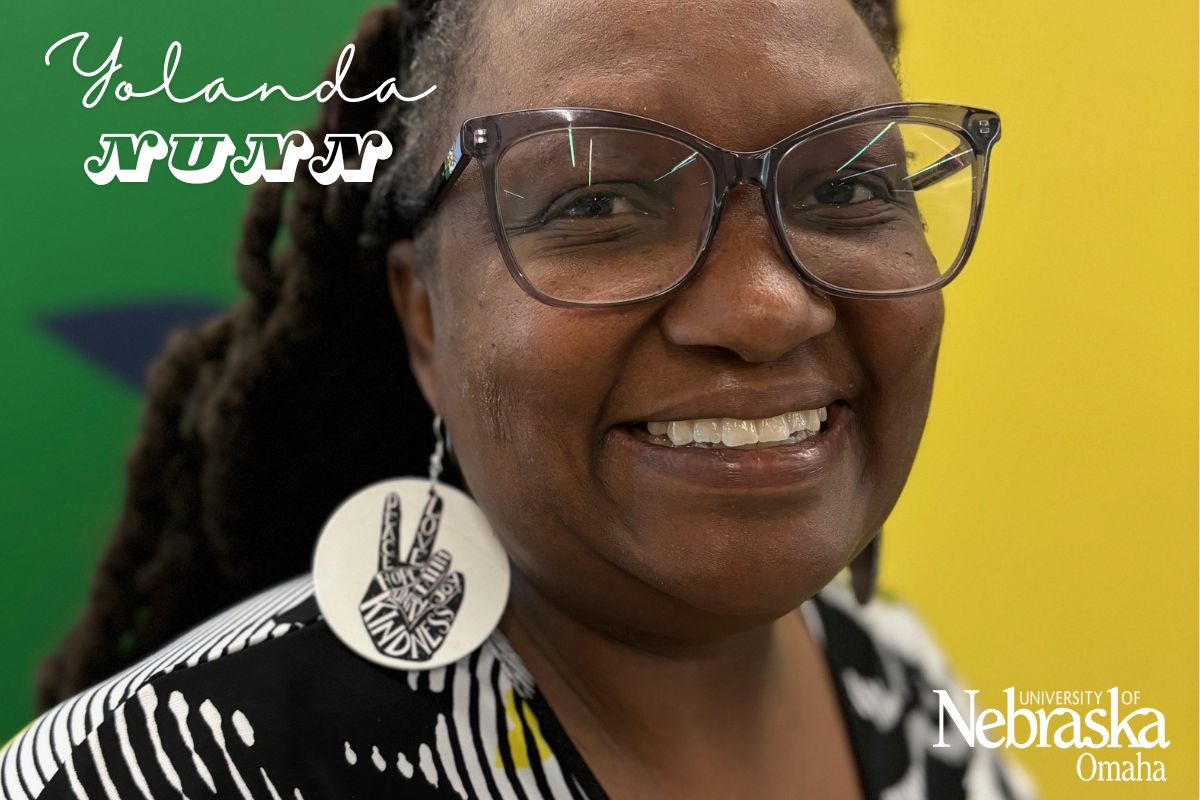Yolanda Nunn: From Goodrich Scholar to Restorative Justice Advocate
- published: 2024/09/11
- contact: Debbie Vihstadt - College of Public Affairs and Community Service
- phone: 402.554.3033
- email: dvihstadt@unomaha.edu
- search keywords:
- education criminal justice restorative justice

In 1998, Yolanda Nunn graduated from the University of Nebraska at Omaha laying the foundation for her impactful work supporting at-risk youth and addressing systemic issues. As a Goodrich Scholar, Nunn’s academic journey was marked by a deep commitment to learning and community service. Recently, she completed training with the Juvenile Justice Institute through the International Institute for Restorative Practices, adding a powerful tool to her repertoire for making a meaningful impact in her community. This training has empowered Nunn to work more effectively with organizations like Radius and address systemic injustices.
The Power of Restorative Justice
Restorative justice, a response to wrongdoing that focuses on repairing harm and maintaining positive relationships, is central to Nunn’s work. “Restorative justice isn’t just about addressing the crime,” Nunn says. “It’s about healing the wounds that crime leaves behind and rebuilding trust.” This approach addresses the root causes of crime and seeks to transform unjust systems and structures, aligning with Nunn’s commitment to supporting vulnerable youth and communities.
The Juvenile Justice Institute's focus on restorative practices has been instrumental in expanding Nunn’s understanding of restorative practices. “The program provided me with the tools to apply evidence-based practices in real-world situations,” she says. The program’s learning objectives—applying evidence-based practices, evaluating policies, and developing leadership skills—have directly influenced her work. Through the institute’s collaboration, Nunn has engaged in critical dialogue, self-reflection, and experiential learning, all of which have deepened her ability to facilitate restorative justice processes.
The program provided me with the tools to apply evidence-based practices in real-world situations."
Repairing Relationships, Restoring Lives
Nunn’s commitment to restorative justice is evident in her work with young people at Radius, an Omaha non-profit organization serving girls and boys ages 12-18 with a focus on restoring relationships between youth, families, and their community. Her approach goes beyond punishment, focusing instead on addressing the broader perspective of harm. “One of the most powerful aspects of restorative justice is the ability to repair relationships,” Nunn emphasizes. The skills she gained through the institute’s collaboration, including motivational interviewing and group facilitation, have been crucial in helping her repair relationships and restore lives. Nunn recalls working with a young man and his family to restore their fractured relationship. “Through honest conversations and mutual understanding, we were able to rebuild trust—a critical step in the restorative process,” she says.
Transformation: Beyond the Individual
Nunn’s vision extends beyond individual cases. She is passionate about addressing the systemic issues that contribute to crime, a focus of the upcoming certificate on restorative practices. “By analyzing the historical and contemporary issues in Nebraska’s juvenile justice system, I’ve become better equipped to propose evidence-based alternatives,” she says. “And to advocate for healthier, safer communities.”
In her future work, Nunn plans to play a more significant role in victim empathy and restorative encounters, particularly for those who have experienced severe harm. The networks she established through the certificate program will support her in these efforts, providing a foundation for continued knowledge sharing and collaboration.
A Legacy of Compassion and Justice
Yolanda Nunn’s journey from Goodrich Scholar and UNO graduate to restorative justice advocate reflects her deep commitment to making a difference. “My work is driven by the desire to transform lives and advance the broader movement for justice and equity,” she says. Her work, enhanced by the Juvenile Justice Institute, has transformed lives and advanced the broader movement for justice and equity. The program, which aligns with UNO’s strategic vision for workforce development, has enhanced her knowledge of evidence-based practices and equipped her with skills directly applicable to working with at-risk youth and staff. As she continues to apply her expertise, Nunn remains a powerful force for change in her community, embodying the spirit of restorative justice.
If you are interested in the Juvenile Justice Certificate Program, contact Monica Miles-Steffens, assistant director of the Juvenile Justice Institute, at mmiles-steffens@unomaha.edu.